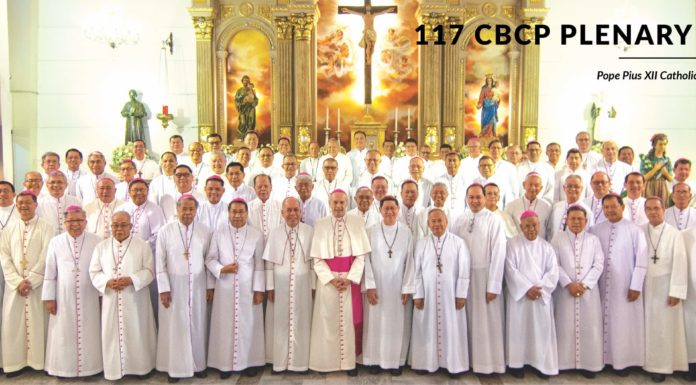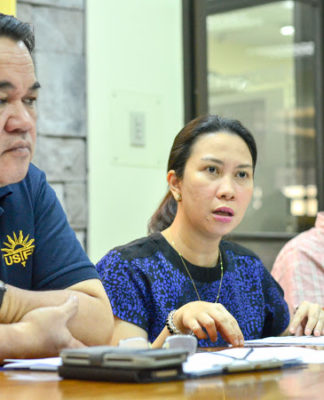GROWING up in a conservative middle-class family and studying in Catholic schools had insulated young Ronald Llamas from the country’s social problems. Now, as a political activist and the president of Akbayan Citizen’s Action Party, he has chosen to be part of the solution.
Llama’s first attempts in activism started at high school, where he wrote human-interest stories and critiques about the grading system for his class, which he considered as an “act of rebellion and a product of restlessness.” His critical spirit and restlessness made him take up Journalism at the Faculty of Arts and Letters (AB) of the University of Santo Tomas in 1978.
In college, Llamas wrote for Hudyat, the official newsletter of the then Samahan ng mga Tomasino sa Pamamahayag (now the UST Journalism Society), The Flame, the official student organ of AB, and the Varsitarian, where he served as Features editor. However, Llamas was meant for bigger things.
The turning point came when Llamas witnessed the demolition of a slum in Tondo, Manila, where he was invited by the AB Pax Romana. Back then, he did not even know what a squatters’ area was, and the sight of Metrocom police batting pregnant women in the frontlines while the demolishers thrashed the poor’s makeshift houses to the ground touched him so much.
“Yun ang first time kong makapasok sa squatters’ area. I realized then na masyadong isolated at makitid pala ang aking mundo at meron pang mas malaking mundo sa labas,” Llamas said.
He realized he must make a difference. “There is no turning back.”
Llamas then started writing about the situation obtaining under Martial Law, which severely restricted information and curtailed the press.
“Thomasians then were not very critical of their surroundings. Information about current events were also not readily available in the University,” he said.
In a special issue of Flame, he wrote the satire, “Confessions of a Butcher,” in which a sinner with remarkable affinities to the strongman, Ferdinand Marcos, and his defense chief, Juan Ponce Enrile confesses to slaughtering the people. The article changed the tenor of the publication, which previously had been literature-centered. “Magandang instrument ang Flame, lalo na ‘nung Martial Law, para ma-inform ‘yung mga student kung ano ba talaga ang kilos ng Martial law at kung ano ang alternative,” Llamas said.
When the administration warned the Varsitarian against publishing anti–government sentiments, Llamas gave up his editorship and urged his fellow staffers to resign en masse due to the editorial intervention. Most of the staff decided to remain when the administration talked to them.
Still, he knew writing about the issues was not enough. To achieve change, he had to work from within.
In 1981, Llamas became the first president of the AB Student Council after its resurrection when Martial law was lifted. “Sa tingin ko, kailangan naming gamitin ‘yung oportunidad na ‘yun para ibalik ang student activism at political consciousness sa University,” he said.
Llamas created the first student constitution in the University in order to check administration meddling. Other colleges followed suit. Later, the Central Student Council was formed.
Llamas also helped establish the Youth for the Advancement of Faith and Justice (YAFJ), an intercollegiate student youth movement that became dominant in student politics in the university-belt. YAFJ became the rival of the league of Filipino students, becoming the training ground of UST activists in the 1980’s and early 1990’s.
Llama’s “shining moment” came when he personally gave John Paul II a letter containing the Filipino student’s sentiments against the Marcos dictatorship in 1981, the first papal visit of the Polish Pontiff. “I took our issues to an international level,” he said.
Despite the clashes with the UST administration, Llamas said UST is a fine learning institution. “Maraming magagaling na professors. Malaki ang naitulong nila sa amin, from tacit approval sa mga ginagawa namin hanggang active support, because they gave us freedom to explore and to actualize our theories and principles na natutunan namin sa UST,” he explained.
Neither left nor right
After graduation, he gave up the pen and joined the trade union movements, in which he played a role in toppling down the Marcos regime. Later on, he started to organize labor and other sectional groups.
Plans on party-building began in 1994. “It’s about time na hindi na lang kami dapat kumikilos sa labas, kailangan na ring mag-organize sa loob. At hindi pwedeng sigaw lang tayo nang sigaw ng ‘Ibagsak,’ kailangan may itatayo rin tayo,” Llamas said. So, along with other pro-democracy groups, he pushed for the approval of the party-list law.
Four years later, Akbayan was formally established in a founding national congress, Llamas was elected its president. In the first local and party-list elections in 1998 the Commission on Elections tried to disqualify Akbayan, but failed. The party landed seventh among the 128 party-list candidates and got a seat in Congress. Since then, Akbayan had been breaking grounds in the world of traditional political parties.
Last November, Akbayan became a member of the Socialist International, the worldwide organization of social democratic, socialist and labor parties. And last May, it won three seats in Congress. They are now occupied by Representatives Etta Rosales, Risa Hontiveros and Mayong Aguja.
Nevertheless, Akbayan is but one small party, Llamas said. Despite its gains, it cannot do much on the national level. “On the local level, meron kang pwedeng gawin. Meron kang mga ‘islands’ na pwede mong unti-unting i-develop at i-democratize, eventually with enough numbers you can make a big institute,” he said.
In what Llamas calls as “green patches in a bleak landscape,” Akbayan works for program-based politics that propose gradual changes from below. And this, he thinks is what sets Akbayan from the other parties.
“This is our third path,” Llamas said. “We opt for the less destructive way of changing the society, rather than the arm-struggle extreme-leftists want. And at the same time, we can eradicate the trapos and corruption in our present government. “Hindi lang expose and oppose, but what do we propose?”
No turning back
Llamas said it is a make-or-break time for the Philippine progressive politics. “This is a historic generation struggle, dahil nasa dulo na tayo e. it’s up to us to choose whether we fall into the abyss, or we retreat and develop,” he said.
Still, he believes all is not lost for the country—not if he can do something about it. Along with his “band of brothers” in Akbayan, Llamas marches on with a progressive reform agenda.
“We know this is an uphill climb, but at the very least pwede naming sabihin sa susunod na generation may ginawa kami, hindi lang kami tumahimik, hindi lang kami nag-migrate, hindi lang kami umiwas, we confronted the problem head on.”
In the final analysis, rational reformation is within the capacity of everyone. “This is beyond ideology, beyond religion, beyond activism,” Llamas said. “Kahit ano pa ang iyong pananaw, kahit ano pa ang iyong political orientation, try to leave the world a better place. Kung marami sa atin ang gagawa nun, we have a future.”














